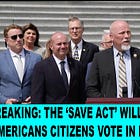Delayed Democracy: How 800,000 Texans Lost Their Voice in Congress
When a Representative dies in office, Governors can't appoint a temporary replacement, but they can delay a special election.
It’s been over two months since Representative Sylvester Turner’s passing, and nearly 800,000 residents of Houston’s 18th Congressional District are still waiting for their seat in Congress to be filled. But don’t worry, Governor Greg Abbott says everything’s fine. He’s scheduled the special election for November 4, a mere eight months after the vacancy began.
Abbott’s explanation came late; when it did, it raised more questions than it answered.
Why the delay? According to Abbott, Harris County just isn’t ready. Never mind that the local elections office says it’s ready. Never mind that the district is majority-Black and historically underrepresented. Never mind that millions in federal funding for flood relief, food aid, and housing are hanging in the balance.
In the meantime, TX-18 remains voiceless, by design, not by accident.
We just hit 13,000 subscribers—thank you!
Get exclusive analysis and fearless reporting you won’t find in corporate media.
A District with a Legacy & a Target on Its Back
For decades, Texas’ 18th Congressional District has been a political and cultural stronghold, home to civil rights champion Barbara Jordan, then Sheila Jackson Lee, and most recently Sylvester Turner. It’s one of the most racially and economically diverse districts in the state, anchored in Houston’s Black and Latino communities. And that makes it a problem for a Republican governor playing the long game.
When Turner died in early March, the expectation was clear: a prompt special election to fill the seat, restore representation, and get TX-18 back in the federal game. Instead, what the district got was silence and then delay. Governor Abbott waited more than a month to even announce the date. When he did, it was a jaw-dropper: November 4, 2025.
In Texas politics, this isn’t just a stall. It’s a strategy.
Abbott’s Excuse Machine & Why It Doesn’t Hold Up
Governor Abbott claimed the delay was necessary due to “election integrity” concerns in Harris County, referencing ballot shortages and long lines from the 2022 midterms. What he didn’t mention is that those issues were investigated, corrected, and have not recurred. Harris County successfully ran multiple elections in 2023 and 2024.
Harris County Clerk Teneshia Hudspeth even stated publicly that the county could conduct a special election within weeks.
Despite clear readiness from Harris County officials, the governor dragged his feet.
So why wait eight months?
Because the delay:
Keeps a safe Democratic seat empty
Strengthens a razor-thin GOP majority in the House
Is wrapped in the language of “process,” not partisanship
Abbott didn’t avoid the law. He exploited its vagueness.
Two Chambers, Two Rules: Why the Senate Gets a Backup Plan
When a U.S. senator dies in office, the gears of governance don’t grind to a halt. That’s because the Constitution and most state laws give governors a safety valve: the power to appoint a temporary replacement until a special election can be held. It’s not ideal, but it ensures continuous representation.
But in the House? No such luck.
If a representative dies, no one can be appointed. The seat stays empty until a special election is held. That’s not a loophole. It’s by design. The Constitution requires that House members be directly elected by the people.
So when a House seat becomes vacant, the clock starts ticking. Or at least it should.
In practice, it’s not the Constitution but state law that sets the timeline for a special election. And that’s where things get murky. Some states act quickly. Others—like Texas—leave a wide window for delay, and governors can exploit that ambiguity for partisan advantage.
The result? One set of rules for Senate power plays. Another set of rules for everyday representation. And when state leaders manipulate the calendar, democracy doesn’t just stall; it stops.
Left Behind: The Real-World Impact on TX-18
For TX-18 residents, this delay isn’t abstract—it’s personal.
No member of Congress means no one to:
Push through federal housing grants
Secure infrastructure and flood mitigation dollars
Advocate for Social Security, Medicare, or VA claims
Help small nonprofits apply for federal funding
And the numbers make the impact clearer:
Over 22% of district households live below the poverty line
More than 68% of the population is Black or Latino
Roughly 1 in 3 households lack a personal vehicle
More than $12 million in Community Project Funding is frozen
The consequences of this delay aren’t hypothetical. They’re already cascading.
With hurricane season approaching, the silence isn’t just undemocratic, it’s potentially deadly.
"We have seniors, veterans, and working families who are suffering while Austin plays games with the calendar," said Christian Menefee, Harris County Attorney. "The people of TX-18 deserve full representation—not bureaucratic stall tactics."
A Quiet Playbook: How Procedural Suppression Is Going National
This isn’t just about Houston. It’s part of a national pattern.
Across GOP-led states, we’ve seen this creeping strategy unfold:
Wisconsin (2018): Gov. Scott Walker refused to hold special elections until forced by court order
Georgia (2021–22): State GOP seized control of local election boards in majority-Black counties
Florida (2022): Gov. DeSantis bulldozed through Black-majority congressional districts
Michigan (2023): Republicans attempted to override voter-approved election reforms
TX-18 is simply the latest test case in a larger project to exploit procedural ambiguity for partisan gain.
It’s always the same tactic: create a procedural delay, then claim it’s legal.
This is voter suppression by red tape. It’s slow. It’s subtle, and it’s deeply dangerous.
See our previous reporting on attacks on voting rights and voter suppression:
Note: These articles are more than 45 days old and now live in our archive. Please consider becoming a paid subscriber for the full nearly 600 article archive, exclusive content, and occasional early access.
Can the People Sue? The Case for Legal Action
Legal experts say the people of TX-18 may have a case. The delay may violate several constitutional protections:
1. First Amendment
The right to petition the government is hollow if there’s no representative to petition.
2. Fourteenth Amendment
When one district is left without a voice, especially a majority-minority district, it raises equal protection concerns.
3. Article I, Section 2
The Constitution implies a guaranteed right to representation in the House. Eight months of silence could breach that.
Potential plaintiffs include:
Voters and residents
Candidates
Nonprofits
Civil rights groups like the NAACP LDF or ACLU
In 2018, a court forced Wisconsin’s governor to schedule elections he tried to dodge. TX-18 may be the next battlefield.
Missing in the Headlines: A Media Blind Spot
Despite the scale of disenfranchisement, national media coverage has been minimal. There have been no front pages, primetime segments, or Sunday roundtable debates.
Compare that to the wall-to-wall coverage of contested House races or out-of-cycle elections in swing states. The media’s silence helps normalize what should be an unmissable democratic failure, which deserves local and national reckoning.
And when no one’s watching, the erosion speeds up.
Delayed on Purpose & What Comes Next
Democracy doesn’t disappear all at once. It erodes, quietly, calendar block by calendar block.
Governor Abbott’s delay isn’t administrative. It’s political engineering, a way to weaken federal opposition, silence diverse voters, and claim procedural authority while doing it all.
But that only works if we let it.
Take Action: Demand Representation Now
Call the U.S. Capitol Switchboard:
(202) 224-3121Suggested Script:
”Hello, I’m calling to demand that Congress investigate Governor Abbott’s delay of the TX-18 special election. Nearly 800,000 people have been left without representation for eight months, which is unacceptable. Please act now to restore democracy and accountability.”Contact Governor Greg Abbott's Office:
Tell him directly that this delay disenfranchises Texans and undermines democracy.
Phone: (512) 463-2000
Email: https://gov.texas.gov/contactSupport Organizations Fighting Voter Suppression:
NAACP Legal Defense Fund: naacpldf.org
Brennan Center for Justice: brennancenter.org
ACLU Voting Rights Project: aclu.org
Raise Awareness:
Share this issue on social media using hashtags like #TX18Voiceless, #DelayedDemocracy, and #LetTX18Vote. Demand coverage and accountability.Donate to Civic Engagement Groups:
Help fund legal challenges, outreach campaigns, and voter education programs that protect representation for all communities.
Democracy only works when everyone has a seat at the table. Don’t let silence become the norm.
We just hit 13,000 subscribers—thank you!
Get exclusive analysis and fearless reporting you won’t find in corporate media.
Bibliography:
Harris County Clerk. “Statement on Election Readiness.” Houston Chronicle, April 2025.
U.S. Census Bureau. QuickFacts: Congressional District 18, Texas.
Scherer, Emily. “Legal Challenges Loom Over TX-18 Delay.” Punchbowl News, April 2025.
“Abbott Delays TX-18 Election, Cites Election Integrity Concerns.” AP News, March 2025.
NAACP Legal Defense and Educational Fund, Inc. Democracy Diminished: State and Local Threats to Voting Post-Shelby County, Alabama v. Holder. June 2019.
“Statement on Greg Abbott Denying Representation to 800,000 Texans in 18th Congressional District.” Texas Democratic Party, March 2025.
“Menefee Slams TX-18 Delay.” North Channel Star, April 2025.
Brennan Center for Justice. Voting Rights & Elections.
American Civil Liberties Union. Voting Rights.
Congressional Research Service. House of Representatives Vacancies: How Are They Filled? IF11722. December 16, 2024.
Congressional Research Service. Filling U.S. Senate Vacancies: Perspectives and Contemporary Developments. R44781. April 12, 2018.










Republicans manipulated the system to their advantage despite the consequences.
VOTE them out! They are destroying a Democracy.
This is 100% to enable the MAGA agenda - an agenda that cuts public benefit programs (SNAP, Medicaid) - it is about silencing dissent - it is about enabling a fascist regime to keep on criming.